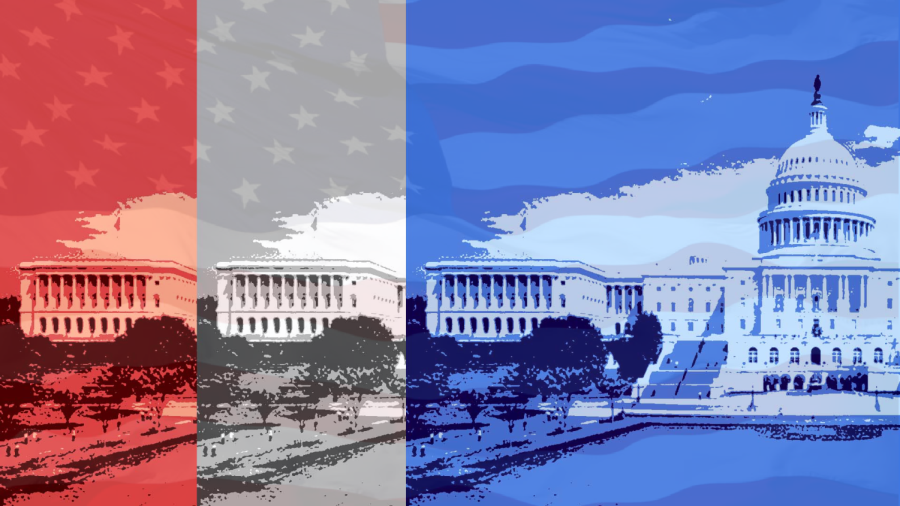Linnabary: The US Administrative State Has Too Much Power
(Graphic by Claire Peterson | The Daily Utah Chronicle)
October 30, 2021
We often take the separation of powers for granted since the United States has strategically placed checks and powers designated to each government branch. The fallout of the 2020 election exemplifies how our separation of powers works. A transition of power occurred despite former President Donald Trump’s determination to remain in office.
Congress has many key capabilities, including the purse, impeachment and lawmaking. However, beginning in the 1930s, Congress started to relinquish its power to the executive branch and the administrative state, further empowering a single component of government.
If we’ve learned anything from the 2020 election, it should be that empowering the executive and administrative state can have massive consequences.
The History
The administrative state has slowly adopted certain lawmaking power and is estimated to create 3,000 new rules or policies a year. But policymaking was originally intended for the legislative branch. Unfortunately, Congress has grown comfortable simply setting goals for administrative agencies and empowering them to make the rules and decisions to accomplish them.
Peter J. Wallison of the American Enterprise Institute said, “The Framers had seen in their own time that tyranny resulted when the same person or institution held the power both to make laws and to enforce them.”
This change in who makes a majority of the U.S. policy and rules didn’t occur overnight. This erroneous expansion of the administrative state is due to Congress’s passage of enabling acts. Congress uses an enabling act, which “confers new powers on an entity.” In this case, Congress uses its power to grant entities new authority to empower the administrative state.
The Issues
The passage of the Dodd-Frank Act illustrates this enabling. Championed by Massachusetts Senator Elizabeth Warren, the Dodd-Frank Act created the Consumer Financial Protection Bureau (CFPB), a new administrative agency responsible for consumer protection within the financial sector. The Dodd-Frank Act gave the CFPB the ability to draw upon funds from the Federal Reserve System without going through Congress. This should cause concern, as the Federal Reserve and the Appropriations Committees of the House and Senate were explicitly prohibited from having oversight on this funding.
This flies in the face of Congress’ constitutionally granted power of the purse, or the ability to appropriate funds and control spending. Traditionally, an administrative agency within the executive branch would need congressional permissions to appropriate its funds. However, under the Dodd-Frank Act, the CFPB would not have to. Eleven years after the passing of the Dodd-Frank Act, the Supreme Court gave the power to control the CFPB’s funding to the president by ruling that the president can remove its director without cause. While the president is at least an elected leader, this still shatters the constitutionally established power of Congress to control funds.
A powerful administrative state has negative impacts all over the country — even here in Utah. The Biden administration’s use of the Occupational Health and Safety Administration (OSHA) to enforce vaccination requirements on private companies demonstrates a current use of this power. Whether one agrees with the policy measure or not, it’s troubling that a group of unelected bureaucrats in an office in Washington D.C. have this capability.
In a statement, Utah Senate President Stuart Adams said this use of the administrative state “ignores the fundamental separation of powers and steamrolls individual liberty” and said this action was “inappropriate.” This power granted to OSHA once again follows a disturbing trend. Congress continually gives power to unelected administrative states and the executive branch.
Guarding the Constitution
As Federalist Paper No. 78 says, the courts are the “Guardians of the Constitution.” With our established system of granted powers and checks being eroded by the institutions of power themselves, the courts can potentially save our system. A legal theory known as the nondelegation doctrine is an available mechanism for returning power back to Congress. The theory says that Congress cannot delegate its legislative powers to the executive branch and administrative state. The Supreme Court has validated this theory in the past. With a six-member majority on the court supporting the nondelegation doctrine, the Supreme Court has the ability to rein in the administrative state.
It’s time for Congress to take its constitutionally mandated role as a legislative branch seriously once again. Though the use of the nondelegation clause will not be an overnight fix, Congress cannot continue to hand over its power to the administrative state out of convenience.










Joey • Nov 2, 2021 at 9:53 am
Why would you publish this in the midst of our pandemic. We already have so many vaccines we need to get anyways for school. Also calling the doctors “unelected bureaucrats” is extremely, how do I put it, dumb? You don’t want scientists to be elected; you don’t want someone like that to bend to people just because they scream and cry and wail because of a little jab. We literally could’ve ended this pandemic, but no, people like you adding to vaccine hesitancy alongside all the misinformation already is what made a pandemic now endemic. This is highly irresponsible to publish during a pandemic, especially when the item in question is already required and preexists the current sitting president. I’m highly disappointed to know that you’re associated with our school, which is best known for its medical program.
J • Nov 2, 2021 at 9:32 am
GET VACCINATED AND WE WOULDNT HAVE RHIS PROBLEM
Ana Maria Facelli • Nov 2, 2021 at 8:38 am
OSHA is a respectable organization that regulates all kinds of issues related to health and safety and is governed by professionals with degrees in such matters. Unlike The “elected politicians” who speak against public health and make decisions to gain favors with their followers and put them at risk, the professionals at OSHA know what they are talking about. I’m glad, Congress gave power to such organizations, for once, they did the right thing. Almost 800,000 people have died of Covid, taking precautionary measures to save lives should not be a political issue, no matter if you agree with it or not. I believe in scientific evidence, not in political gain.